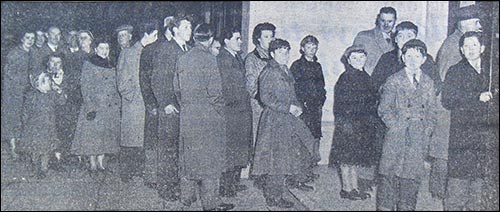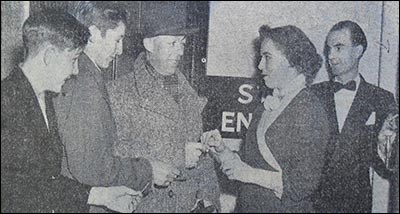The Rushden Echo and Argus, 20th January 1956, transcribed by Jim Hollis
Sunday audience was ‘like a church congregation’
“Like a church congregation.” That is how Mr. N. Kimber, manager, describes his first Sunday audience at Rushden Royal Theatre. He had heard from other districts that Sunday audiences were inclined to be noisy, but his was one of the best ever, he told us.
Mr. W. R. Hewitt, manager of the Ritz, thought his audience “a fairly typical Sunday one – all young people mainly boys and quite well behaved.”
Churches reported “no difference in evening service attendances.”
Rushden took its first day of Sunday cinemas very calmly. At first it looked as though what had begun with a town’s meeting, great arguments and eventually a public poll, might end in a whimper.
The Royal Theatre (whose manager was the first person to ask for a licence), and the Ritz both opened their doors at 5.15 p.m. preparatory to showing a programme that lasted till 9.25 with a main feature being shown twice.
 |
|
The queue just after opening
|
Just past five o’clock there were about ten men and boys waiting outside the Royal, and a young couple and some youths outside the Ritz. When the doors of the Royal opened the stragglers outside had formed themselves into the semblance of a queue in which men outnumbered women by about five to one. However, between five-thirty and six, there was a steady stream of people quietly buying their tickets at the box office.
No excitement. No Noise.
Over half the people were “out of towners” in their early twenties from Finedon, Yeldon, Newton Bromshold, Raunds, Sharnbrook, Irchester, Irthlingborough, Melchbourne, Addington. Many were confirmed Sunday cinemagoers and usually had to go into Wellingborough or Bedford. Now “it was much easier,” and they would be coming to Rushden regularly, they said.
 |
|
First three in the queue at the Royal Theatre for Rushden’s first Sunday cinemas. Handing over his ticket to usherette Betty Harrison is Mr E Richwood, of Rushden, and behind him are Lionel Gibbs, Stanwick, and Ron Wilmott, Raunds. Man with the welcoming smile is Mr N Kimber, manager of the Royal, who was responsible for the first move in getting Sunday cinemas for the town.
|
‘Churches Have Nothing to Offer’
A middle-aged man remarked as the queue thickened: “You would not get them going into church like this. The churches today have nothing to offer – at least not to 80 per cent of the people.”
Nearly half those attending had come from Rushden and Higham Ferrers and were middle-aged or young couples. The Rushden people were mostly those who had voted for Sunday cinemas and had come along to back their votes up and see what was offered. Others were glad to find an alternative Sunday amusement to TV.
Another middle-aged man said: “The pubs and the clubs don’t open till seven, and when you have been working all the week there’s not much relaxation or fun in going to church.
Most of the young Sunday “regulars” – nearly all male from out of Rushden – went on Sunday because they did not have time during the week. Noticeably absent were the Americans, who generally make up a large part of the weekly audience in Rushden. Those few who did attend were young couples who lived in or near Rushden.
At the Ritz, those going in were entertained, while they waited, by the Rushden Salvation Army Band, which regularly holds its open-air meeting there on Sunday evenings – “and shall continue to do so.” said Senior Captain H. Davies.
Attendance Was ‘Satisfactory’
Among the patrons was an immaculate Teddy Boy.
Mr. Hewitt would not disclose attendance figures. He said they were satisfactory, but as he expected, “it was not a full house.”
At the Royal, 847 people paid to go in and there were no “halves.” Average weekday attendances are 500-600. Said Mr. Kimber: “I am very pleased it was much better than I had anticipated.”
Usherette Betty Harrison, of Rushden, asked how she liked working on Sundays, said: “I’ve always been to a cinema in Bedford, anyway. With fares, that cost me ten shillings, so this suits me.”
The Royal had a very even distribution of seats sold; at the Ritz it was the 2s 2d seats that were the favourites.
The Rev. A. Stuart Arnold, minister of the Park Road Baptist Church, said he had a good congregation with a lot of young people.
The Methodist minister, the Rev. D. Holwell, made a similar report. He thought that the church activities and regular organisations, such as the Youth Circle, would not be affected at all.
Both agreed that probably the type of person who would go to Sunday cinema would not be a churchgoer in the first place.
|